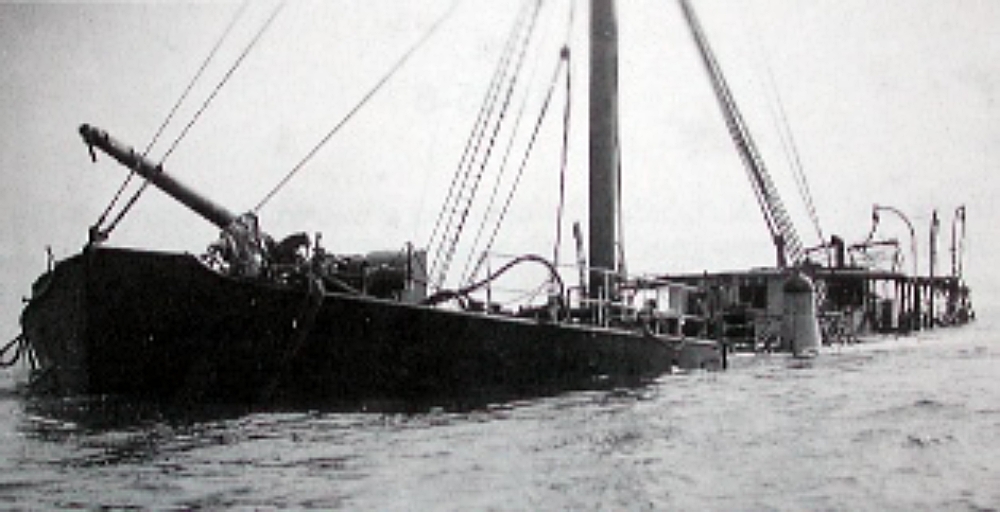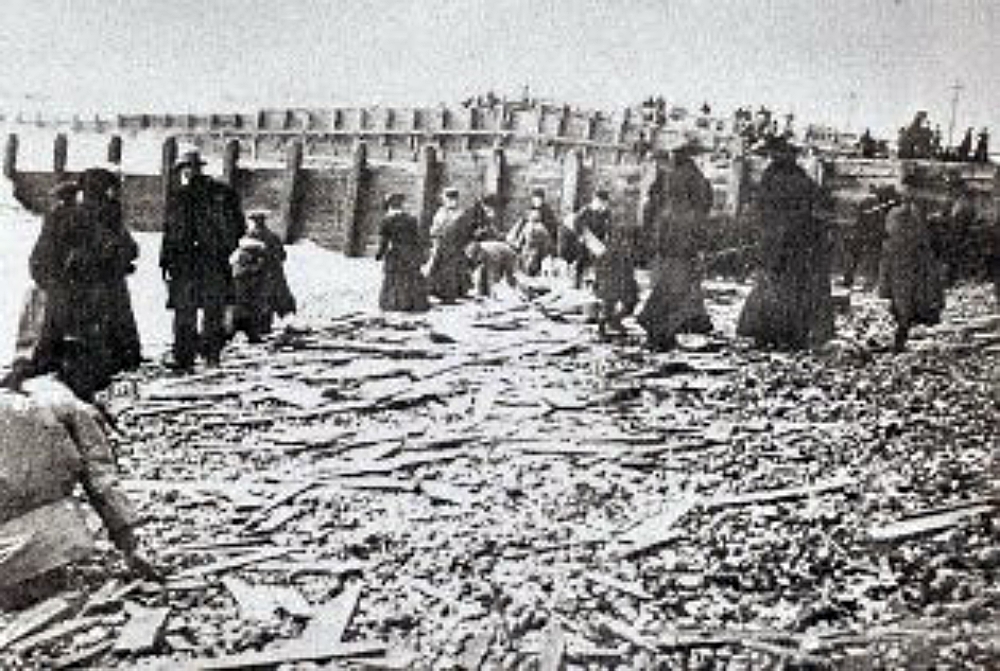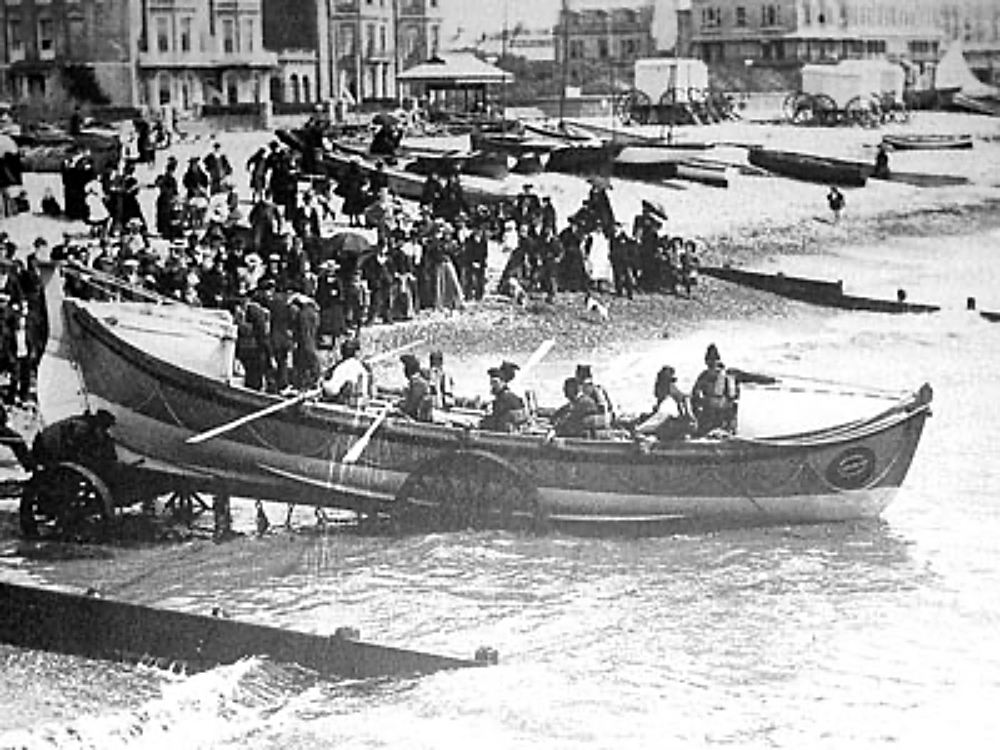Oranges are not the only fruit
Thousands of planks of timber ended up on Worthing beach in recent times, washed ashore from a wrecked cargo ship, it became an international incident and pictures of it were published all over the world.
But it wasn’t the first time Worthing’s residents had woken up to find their beach covered with unfamiliar objects by the thousand.

Just over a century earlier, it had been tens of thousands of oranges and lemons…
IT was 1901 and the month was March.
Coxswain Marshall of the Worthing lifeboat, Henry Harris, stayed on duty all night to keep a watchful eye on a light, presumably on a ship, which had been spotted two miles off the beach at East Worthing.
At dawn, he could make out a steam-ship, very low in the water and with her bows pointing shoreward.
Signals from shore remained unanswered and, at eight o’clock, it was decided to launch the lifeboat, Henry Harris. But even before it reached the stranded vessel – which turned out to be the trading steamer Indiana – excitement had intensified among the crowds gathering on the beach.
For oranges and lemons were being washed up in their thousands and news of the unexpected phenomenon was spreading through the town like wildfire.
Costermongers came with their horse trolleys, tradesmen and professional men were arriving with baskets and hundreds of children brought sacks, pails and anything in which fruit could be carried.
All were intent on reaping the unanticipated but welcome golden harvest of the sea.
In the scenes which followed, fists played a prominent part as more and more cases of the fruit were washed ashore and began to pile up on the beach.
My grandfather was one who collected his share (though he never told me how many that meant!). He said many cases were smashed upon the groynes and, though some were stacked up on the beach, others were carted away wholesale by “the more ambitious”.
At first, much of the fruit was washed up west of the pier, but, gradually, the spoils and the crowds moved further east. Beyond Splash Point, the surface of the water became what my grandfather described as “a sea of orange”, and each golden-crested wave brought in more and more, carpeting the beach in all directions.

A constant stream of men, women, boys and girls were seen wending their way homewards heavily laden with fruit, then returning for more and more.
Meanwhile, the lifeboat Henry Harris had reached the Indiana. It circled the vessel twice to ensure there were no survivors on board, and then returned to shore.
Tramping through what by now had become a pulpy mass on the beach, Coxswain Marshall reported that its crew had evidently abandoned the Indiana. She was now mostly under water and, though the cause of the disaster could not be ascertained, it was most likely to have been a collision.
The Worthing lifeboat had been pulled ashore and remounted on its carriage when, suddenly, a cry went up that a small boat with at least one man aboard had been spotted off the Half Brick public house.
“All right, we’ll launch her again!” responded the coxswain. But before the Henry Harris could reach the drifting boat, a man named Clark, of the Lancing Coastguard, swam out and brought it ashore.
It was, indeed, one of the Indiana’s lifeboats and there was a compass on board – but the “occupants” turned out to be a plank of wood!
Late that afternoon, the people of Worthing resolved the mystery.
During a thick Channel fog, the Indiana had been rammed amidships by the City of Washing-ton, an oil steamer from Hamburg.

Fortunately, the crew of 23 had all been rescued by a tug and taken safely into Newhaven.
Meanwhile, back on Worthing beach, remnants of the abandoned Indiana’s cargo were still drifting ashore.
All that Saturday night, people patrolled the beach between Goring coastguard station and Brighton, gathering the spoils by moonlight.
Besides fruit, they found several copper tanks encased in wood and containing lemon essence – a very expensive commodity – and containers of an ingredient used for tanning.
It is hardly necessary to add that by the time a salvage boat and tug arrived the next day, the beach and water had been picked clean.
Later that week, the following paragraph appeared in Messrs Plumbridge and Son’s wholesale fruit price list: “Oranges – The market is deficient of 6,000 cases of Valencias this week, which were coming forward by the Indiana, now lost off Worthing.
“Lemons are also some thousands of cases short, in consequence of the aforementioned disaster, and the prices are a little firmer.”
At which point I have to declare a retrospective interest in this matter. In those days, the Feest family owned several greengrocery shops, so you may guess where they got their supply of oranges and lemons from that week.
The problem was that everybody else in Worthing also got plenty free of charge and, while, in other towns, the shortage of citrus fruit temporarily sent prices soaring, here in Worthing for the next few weeks, my grandfather and his brother couldn’t give it away!